
RomanBabakin
Huawei Technologies intends to begin mass-manufacturing of its most advanced AI chips in the first quarter of 2025, despite struggles to make enough processors due to U.S. export curbs, Reuters reported, citing people with knowledge of the matter.
The Chinese tech giant has sent samples of its new Ascend 910C chips, a potential rival to Nvidia’s (NVDA) chips, to some technology companies and has begun taking orders, the report added.
Earlier this week, it was reported that Huawei’s plan to develop more powerful chips for AI and phones is facing hurdles due to the U.S. export restrictions. Huawei has been designing its next two Ascend processors around the same 7-nanometer architecture which been mainstream for years. However, Huawei’s production partner Semiconductor Manufacturing International (OTCQX:SIUIF) is struggling to make even 7nm chips at steady volumes as its 7nm production lines have been impacted by poor yield and reliability issues.
The 910C is being made by SIUIF on its N+2 process, but due to unavailability of advanced lithography equipment the chip’s yield has been limited to about 20%, the Reuters’ report noted.
Chinese chipmakers have not been able to get ASML’s (ASML) advanced chip making machine, the extreme ultraviolet lithography, or EUV, systems, due to U.S. export restrictions. ASML has also stopped shipping its most advanced deep ultraviolet lithography, or DUV, machines to China.
Advanced chips require yields of over 70% to be commercially viable. Huawei’s most recent advanced processor 910B, mad SIUIF, has a yield of about 50%. This has resulted in Huawei cutting production targets and delaying fulfilling orders for that chip, the report added.
“Huawei knows there is no short-term solution, given the lack of EUVs, so it will give priority to strategic government and corporate orders, said a source, according to the report.
SIUIF demands a premium of up to 50% for chips manufactured on its advanced nodes, which are less advanced than those of Taiwan Semiconductor Manufacturing’s (TSM), the report noted.
Earlier this month, TSM was ordered by the Biden administration to stop shipping advanced chips used AI applications to customers in China.
Late last month, Taiwan Semiconductor reportedly halted shipments to Chinese chip designer Sophgo after one of its chips ended up in an AI processor by Huawei. Sophgo said in a statement on its website that the investigation by the U.S. Commerce Department is not related to Sophgo and that it has never been engaged in a business relationship with Huawei.
Huawei was once in competition with Apple (AAPL) and Samsung (OTCPK:SSNLF) to be the world’s biggest handset maker until U.S. restrictions, starting in 2019, began to curb its access to chip manufacturing tools needed to produce its most advanced smartphones. However, last year in August, Huawei surprised many by quietly launching its new flagship smartphone, Mate 60 Pro, reportedly a 5G capable phone.
The chip inside the phone ignited concerns in the U.S. and raised questions about how it was possible, without the company being able to access critical technologies. In April, Huawei unveiled its Pura 70 series, which features the Kirin 9010 chip, a follow-up to the Kirin 9000s reportedly made by SIUIF for the Mate 60 Pro.
Earlier this week, Huawei began taking pre-orders for the Mate 70 smartphone models and is expected to unveil the devices on Nov. 26.
